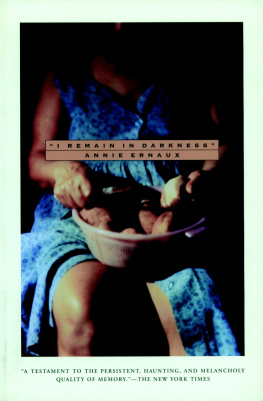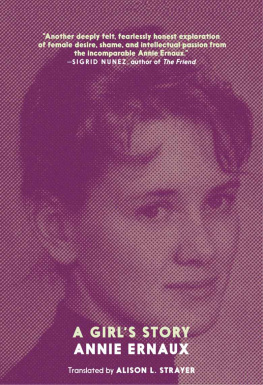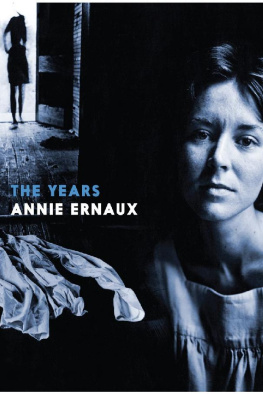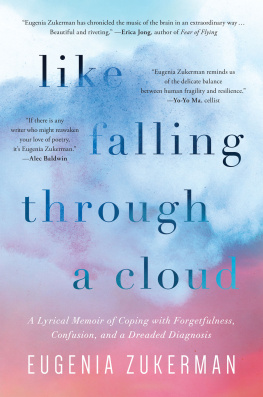
I R E M A I N I N D A R K N E S S
ALSO BY ANNIE ERNAUX
S H A M E
E X T E R I O R S
A F R O Z E N W O M A N
A M A N S P L A C E
S I M P L E P A S S I O N
A W O M A N S S T O R Y
C L E A N E D O U T

English translation copyright 1999 by Seven Stories Press
Editions Gallimard 1997
A Seven Stories Press First Edition
All rights reserved. No part of this book may be reproduced, stored in a retrieval system, or transmitted in any form, by any means, including mechanical, electronic, photocopying, recording or otherwise, without the prior written permission of the publisher.
Seven Stories Press
140 Watts Street
New York, NY 10013
www.sevenstories.com
Library of Congress Cataloging-in-Publication Data
Ernaux, Annie, 1940
[Je ne suis pas sortie de ma nuit. English]
I remain in darkness / Annie Ernaux; [translated by Tanya Leslie]. 1st ed.
p. cm.
ISBN 978-1-58322-014-6 (cloth); ISBN 978-1-58322-052-8 (pbk); ISBN 978-1-60980-238-7 (ebk)
1. Ernaux, Annie, 1940- Diaries. 2. Authors, French20th centuryDiaries. 3. Alzheimers disease. I. Leslie, Tanya. II. Title.
PQ2665.R67Z46713 1999
| 848.91403dc21 | 99-41332 |
| [B] | CIP |
M Y M O T H E R began losing her memory and acting strangely two years after a serious road accident from which she had fully recoveredshe was knocked down by a car that had run a red light. For several months, she was able to continue living on her own in the old peoples residence of Yvetot, Normandy, where she was renting a small apartment. In summer 1983, in the grueling heat, she fainted and was taken to the hospital. It was discovered that she hadnt eaten or drunk anything for several days. Her refrigerator was empty except for a packet of cube sugar. Clearly, she could no longer be left on her own.
I decided to let her come and stay with me in Cergy; I was convinced that the familiar surroundings and the company of my two teenage sons ric and David, whom she had helped me to bring up, would cause her symptoms to disappear and that she would soon become the energetic, independent woman she had been for most of her life.
This was not the case. Her lapses of memory got worse and the doctor mentioned the possibility of Alzheimers disease. She could no longer recognize the places or people she knew, like my children, my ex-husband, myself. She became a confused woman, and would nervously roam the house, or would spend hours slumped on the stairs in the corridor. In February 1984, seeing her state of prostration and her refusal to eat anything, the doctor had her taken to Pontoise Hospital. She remained there for two months, then spent some time in a private nursing home before being sent back to Pontoise and placed in the long-term geriatric ward, where she died of heart failure in April 1986, aged seventy-nine.
While she was still living with me, I began jotting down on small undated scraps of paper the things she said or did that filled me with terror. I could not bear to see my own mother slip into such a state of decline. One day I dreamt that I screamed out at her in anger: Stop being crazy! Subsequently, when I got back from the hospital, I would feel this strong urge to write about her, the things she said, and her body, which I was feeling closer to every day. I would write hastily, in the turmoil of my emotions, without thinking or trying to marshal my thoughts.
Wherever I went, I was haunted by the sight of my mother in that place.
Toward the end of 1985, I began writing the story of her life, with guilty feelings. I felt that I was projecting myself into a time when she would no longer be. Also, I was torn between my writing, which portrayed her as a young woman moving toward the world, and the reality of hospital visits, which reminded me of her inexorable decline.
When my mother died, I tore up this first draft and started work on another book, A Womans Story , which came out in 1988. While I was writing the book, I could not bring myself to read through the notes I had taken during my mothers illness. Somehow I felt I hadnt the right: I had committed to paper her last months and days, including the day preceding her death, without realizing it. This disregard for consequenceswhich may characterize all forms of writing, it certainly applies to minewas horrifying. In a strange way, the diary of those hospital visits was leading me to my mothers death.
For a long time, I believed that I would never have this text published. Maybe because I wanted to offer only one image, one side of the truth portraying my mother and my relationship with her, a truth which I sought to convey in A Womans Story . However I have come round to thinking that the consistency and coherence achieved in any written workeven when its innermost contradictions are laid baremust be questioned whenever possible. Publishing these pages gave me that opportunity.
I have delivered these pages in their original form, echoing the bewilderment and distress that I experienced at the time. I have chosen not to alter the way I transcribed those moments when I was close to her, removed from time (except maybe from my early childhood regained), removed from any thought except: shes my mother. She had ceased to be the woman who had always ruled my life and yet, despite her misshapen features, because of her voice, her mannerisms and her laugh, she remained my mother, more so than ever.
On no account should these pages be read as the objective chronicle of a patients stay in the long-term geriatric ward and certainly not as an accusation (on the whole, the nurses were extremely caring), but merely as vestiges of pain.
I remain in darkness was the last sentence my mother wrote. I often dream of her, picturing her the way she was before her illness. She is alive and yet she has been dead. When I wake up, for a few moments, I am certain that she is still living out there under this dual identity, at once dead and alive, reminding me of those characters in Greek mythology whose souls have been ferried twice across the River Styx.
March 1996
1 9 8 3
D E C E M B E R
She just sits there on a chair in the living room. Staring straight ahead, her features frozen, sagging. Her mouth not quite open but gaping slightly, from a distance.
She says, I cant put my hands on it (her toiletry bag, her cardigan, whatever). Things seem to slip away from her.
She has to watch television now. She cant wait until I have cleared the table. At this moment all she understands is her longing.
Every evening David and I take her upstairs to bed. At the point where the floorboards become carpeted, she lifts her leg up high, as though she were wading into water. We laugh, she laughs too. Later on, after she had snuggled down into bed, gay as a lark, and knocked over all the things on her bedside table by trying to apply some face cream, she says to me: Now Ill go to sleep; thank you MADAME.
The doctor came round to see her. She wasnt able to say how old she was. She clearly recalled having had two children. Two girls, she added. She had slipped on two bras, one on top of the other. I remembered the day when she found out that I had been wearing one without her knowing. The shouts. I was fourteen, it was one morning in June. I was wearing a slip, washing my face.
My stomach pains have started again. I no longer feel anger at her and her loss of memory. A wave of indifference.
Next page








